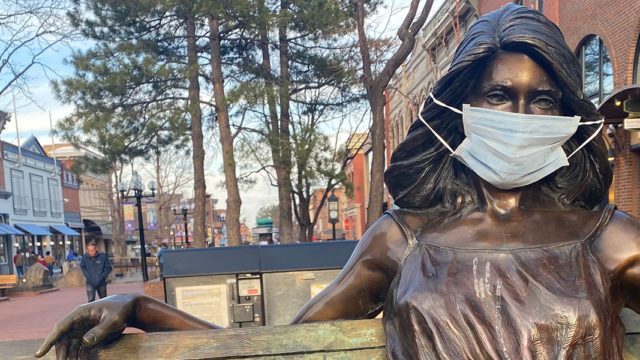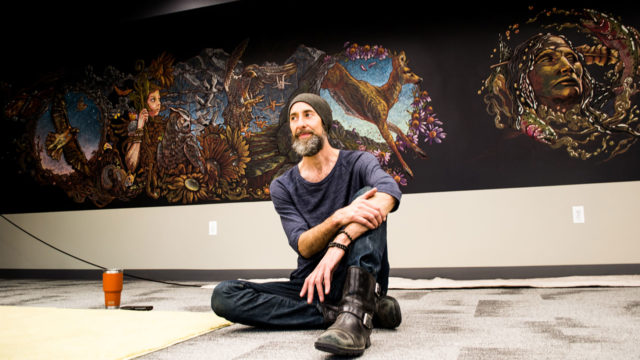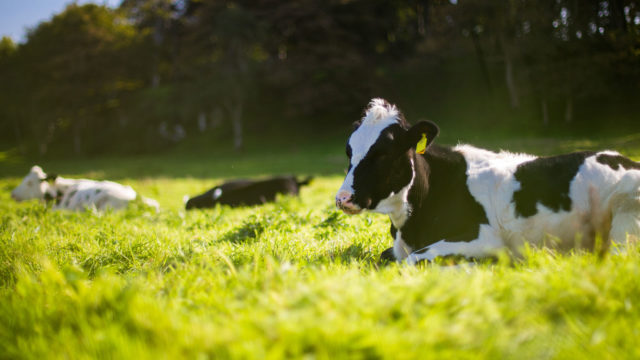With Boulder County considering a proposal that would allow the processing of up to 50 poultry or rabbits each day, four sheep or goats per day, two pigs per day and up to two cows a week, local small-scale livestock farms could help jumpstart a hyperlocal meat economy.
Set in the vast open space of west Longmont, Bluebird Sky Farmstead is one of those farms. It operates a livestock farm from its nearly 30-acre field along Nelson Road. Run by Danny Dunlap and Annaliese Danckers, the farm focuses on regenerative soil practices while raising pigs for meat and keeping ducks and chickens for eggs.
Boulder County’s current land use code requires small-scale farms to process their meat through larger operations, sometimes outside the county. The proposed changes would allow smaller farms like Bluebird Sky to butcher, cut, dress and package its own meat in order to expand their economic potential without a middle man.
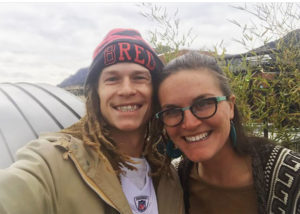
The farmstead seed sprouted when Danny’s mother had money to invest and, knowing Danny had a business mind and that Boulder-area land would hold value and appreciate, she jumped on it.
Danny, who had moved to Boulder from Orlando, Florida, to do the farm-to-table program at Escoffier School of Culinary Arts in South Boulder, moved to the homestead in 2015 while working for BookCliff Vineyards as its assistant winemaker.
Bluebird Sky Farmstead mainly pulls profit from its chicken and duck eggs, which it also feeds to its resident guinea hogs for the added protein, especially for its pregnant ladies. It has feeders and breeders: three female breeder guinea hogs, about three years old, three males raised for meat and a kunekune boar, borrowed from Elk Run Farm for the ladies, which it will trade back in to for some piglets they just purchased.
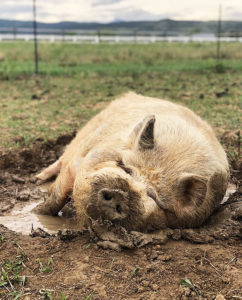
The hogs’ and kunekune boar’s short snouts makes keep them from rooting up the ground as much as other varieties.
“It [the beginning of the COVID crisis] stunk,” Annaliese tells BLDRfly. “We were just ramping up production in spring — the chickens were just getting old enough — and planning on going to market, even as a guest vendor where you sign up for 5-10 slots across the whole season, and then Covid happened.”
With farmers markets paused or operating at an extremely heightened commission rate, the farmstead has relied on selling its eggs privately as well as through a couple local organized efforts such as Ben Benetel’s Singin Seeds project and Browns’ Farm’s CSA, which launched in response to the pandemic.
The farmstead sits on the green belt of Boulder, meaning anyone on properties from there to the mountains west can’t build. Residents can only expand their footprint for a farm building, and at the expense of a very thorough permitting process.
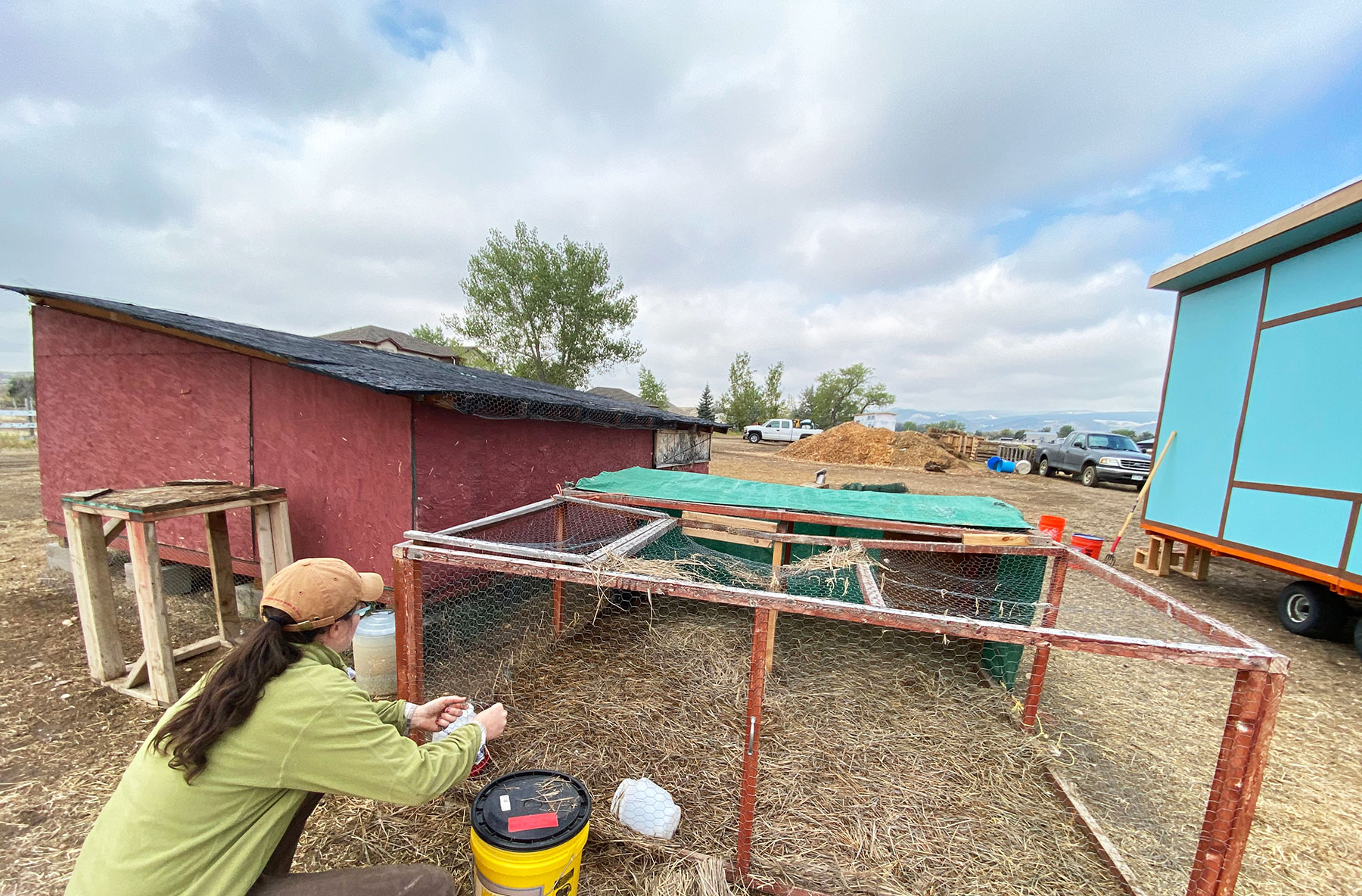
Why raise meat
Danny and Annaliese chose to focus the farmstead on raising meat because land without water rights or access to water in the Boulder area is not easy to grow vegetables on.
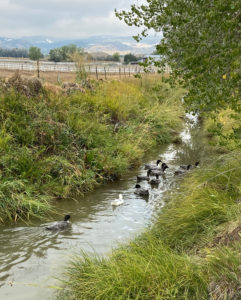
“Water is our biggest issue here,” says Annaliese. “Veggies take a ton of water, so if you don’t have water strong rights, which we don’t, you can’t really grow them. We grow our veggies on city water, but that’s not really sustainable money-wise on a huge scale.”
Stewarding the land, regenerative livestock farmers essentially direct the process making sure the animals stand where they want them to stand and poop where they need them to poop.
“I think any farmer would tell you,” Annaliese says. “Every farmer at their core is a soil farmer. You’re growing the microbiology in the ground and your benefit is you get some good meat every once in a while.”
Though some of these barren-seeming, stomped down grounds may look sad, Annaliese assures us they’re not. With the land fertilized and grass beaten down by the pigs, the microbiology can eat it and Danny and Annaliese can see any rocks or trash they need to remove. The two let the pigs run through an area once, then move them to the next.
If the proposal gets passed, Bluebird Sky Farmstead will legally be able to sell to consumers directly from the farm, Annaliese tells us, and possibly even take what’s butchered on the farm to market.
“This opens up so many avenues for us to advertise to locals,” says Annaliese, who along with Danny is in favor of the proposal, “and to get meat into different consumer streams like restaurants or directly to people. Legally, it makes life so much easier on local producers, especially for chicken. We’re excited that Boulder County is embracing more food sovereignty for consumers in the county, not to mention keeping small producers able to compete more easily.”
The homesteading piece: a green thumb
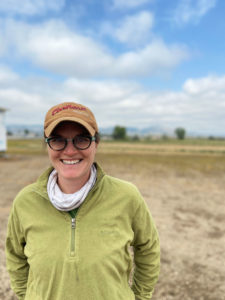
Though the farmstead focuses on meat, a lively half-acre vegetable garden plays a role in the homesteading portion of their lifestyle. Annaliese and Danny’s personal veggie garden, a lawn-turned-garden with no till, grows pumpkins, different types of corn, various peppers, “a whole amazing row” of tomatoes and your regular brassicas, like cabbage, turnips and mustard.
The couple plans to add in more herbs for making pestos and sauces (Annaliese tells us she’s made probably 30 gallons of tomato sauce in the last week) and eventually Danny wants to grow cut flowers, like tulips from the Netherlands. The two also have a roommate who keeps bees for honey as well.
“We’ll do veggies for ourselves, but so many people already do it well,” Annaliese says when we asked if Bluebird Sky ever planned on growing produce for the market.
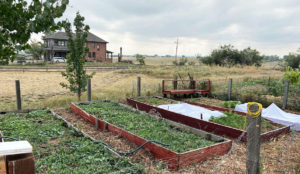
“I’m good at it and I love it. It’s most of our winter food, our homesteading piece. We’re big fans of
tomatoes and noodles. I do share it; that’s the hard thing for me. Like, I know I’ll need this in February or March, but I have so much right now, why don’t you guys take some!”
While operating the farmstead takes up most of her time, Annaliese also works at a goat dairy five mornings a week and many nights, and Danny works full-time at Cellular Recycler, an organization working to keep all the e-waste out of the landfills.
Header Image: Bluebird Sky Farmstead’s new, mobile chicken coop. Image: Tatyana Sharpton.


